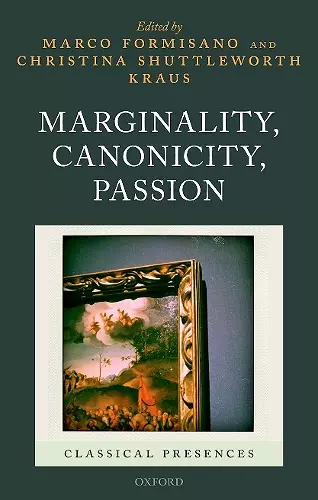Marginality, Canonicity, Passion
Marco Formisano editor Christina Shuttleworth Kraus editor
Format:Hardback
Publisher:Oxford University Press
Published:11th Jul '18
Currently unavailable, and unfortunately no date known when it will be back

In recent years, the discipline of Classics has been experiencing a profound transformation affecting not only its methodologies and hermeneutic practices - how classicists read and interpret ancient literature - but also, and more importantly, the objects of classical study themselves. One of the most important factors has been the establishment of reception studies, examining the ways in which classical literature and culture have been appropriated or responded to in later ages and/or non-western cultures. This temporal and cultural expansion beyond the 'traditional' remit of the field has had many salutary effects, but reception studies are not without limitations: of particular consequence is a tendency to focus almost exclusively on the most canonical Greek and Latin texts which is partly due to the sheer scale on which they have been received, adapted, discussed, and alluded to since antiquity. By definition, reception studies are uninterested in texts which have had no 'success', but the result of an implicit adoption of canonicity as an unspoken criterion is the marginalization of other texts which, despite their inherent value, have not experienced so significant a Nachleben. This volume seeks to move beyond the questions of what is central, what is marginal, and why, to explore instead the range and significance of the classical canon and the processes by which it is shaped and changed by its reception in different academic and cultural environments. By examining the academic study of Classics from the interrelated titular perspectives of marginality, canonicity, and passion, it aims to unveil their many subtle implications and reopen a discussion not only about what makes the discipline unique, but also about what direction it might take in the future.
this book represents, for established philologists, and for philologists-to-be as well, the invaluable opportunity to turn their critical eyes to their own habits. By doing so, the book helps the classical philological community to imagine its own future at the intersection between theoretical reflection and hermeneutical practice. * Giovanna Laterza, Bryn Mawr Classical Review *
Marginality, Canonicity, Passion is a timely contribution...Its biggest strength is its collective reawakening of dormant aspects of the field, pointing to its canonical baggage, implicit orders, and often impossible ambitions to embrace totalities from the center and vice versa. It invites readers not to reject the idea of the canon, but to be aware of its tensions and limitations, as well as its invisible power to dominate the way we read the classics. In sum, it is a valuable contribution, especially if the field is to remain relevant to the profound changes that we are already witnessing in the twenty-first-century arts and humanities. * Laura Jansen, University of Bristol, Modern Philology *
ISBN: 9780198818489
Dimensions: 224mm x 144mm x 28mm
Weight: 602g
384 pages